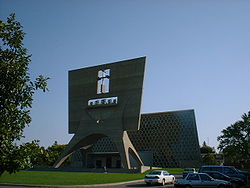Saint John's Abbey, Collegeville

Saint John's Abbey Church and Bell Banner, on the Campus of Saint John's University
|
|
| Monastery information | |
|---|---|
| Order | Order of Saint Benedict |
| Established | 1856 |
| Mother house | Saint Vincent Archabbey, Latrobe, Pennsylvania (founded 1846) |
| Archdiocese | Roman Catholic Archdiocese of Saint Paul and Minneapolis |
| Diocese | Roman Catholic Diocese of Saint Cloud |
| Controlled churches | 19 total Monastic Residence points outside of the Abbey, and 16 of them being Benedictine- run Parishes |
| People | |
| Founder(s) | Fr. Bruno Riss, O.S.B., Fr. Cornelius Wittmann, O.S.B., and the founding German Benedictines. |
| Abbot | Rt. Rev. Fr. John Klassen, O.S.B. |
| Prior | Rev. Fr. Bradley Jenniges, O.S.B. |
| Site | |
| Location | Collegeville, Minnesota, USA |
| Coordinates | 45°34′49″N 94°23′32″W / 45.58028°N 94.39222°WCoordinates: 45°34′49″N 94°23′32″W / 45.58028°N 94.39222°W |
| Public access | Yes |
| Website | www |
Saint John's Abbey in Collegeville, Minnesota, is a Benedictine monastery affiliated with the American-Cassinese Congregation. The abbey was established following the arrival in the area of monks from Saint Vincent Archabbey of Latrobe, Pennsylvania, in 1856. Saint John's is the largest Benedictine abbey in the Western Hemisphere, with 190 professed monks. The Right Reverend Fr. John Klassen, OSB, serves as the 10th abbot.
In 1856, five monks of Saint Vincent Archabbey in Latrobe, Pennsylvania, arrived in St. Cloud, Minnesota, at the behest of the Bishop of St. Paul. They established the priory there and began to minister to the German immigrants in central Minnesota. One of the first ministries of the new community was Saint John's College, which would come to be known as Saint John's Preparatory School. In 1862 the community moved some miles west, into the wooded area of the valley, and again in 1865 to the shores of Lake Sagatagan. It was in this location that the community began to flourish, and in 1866 the priory was raised to the status of Abbey and the community elected Fr. Rupert Seidenbusch as the first Abbot.
By the early 1950s the monastic community had reached to a near 450 monks, and had outgrown the original Abbey church and so plans were made to construct a new, larger worship space which could accommodate a larger congregation. The liturgical movement which would culminate in the Second Vatican Council was in full swing at Saint John's and so the new church was also to be designed with some of the anticipated liturgical changes in mind. (Following the Council, almost no changes needed to be made to incorporate the new liturgical rules.) The community contacted twelve architects and asked them to submit plans for a church which would "be truly an architectural monument to the service of God." In 1954 the community selected Marcel Breuer to design not only the new church but an addition to the monastic enclosure.
...
Wikipedia


